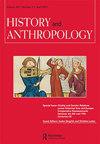驱逐:非洲的知识、时间性和物质性
IF 0.4
2区 历史学
Q3 ANTHROPOLOGY
引用次数: 0
摘要
摘要驱逐重塑了时间、空间和身体的知识和经验。然而,它们在很大程度上是通过欧洲历史或当代全球种族资本主义的历史来研究和理论化的,剪掉了它更长的全球历史。本期特刊着重研究历史经验和非洲不同背景下的驱逐概念。驱逐与知识和权力的形成紧密地交织在一起,包括区域研究和学术学科、国家公民身份和民族国家的形成。这篇引言描绘了驱逐作为时间弯曲和时间模糊的过程是社区、团体和身体作为学术和政治工作主题归化不可或缺的一部分。同时,它认为驱逐是一种关系性的、暴力的过程,它无视时间界限,跨越空间尺度,并推翻了认识论逻辑。物质景观是中介、嵌入和记忆驱逐过程的关键场所,即使它们受到驱逐暴力的冲击。本期特刊认为,对驱逐的研究开启了关于知识、时间和物质形式如何构成的概念性问题。关键词:驱逐、暴力、地区研究、殖民主义、非洲致谢我们要感谢南非金山大学非洲印度研究中心和南非罗莎·卢森堡基金会在项目早期阶段给予的支持。我们要感谢出席约翰内斯堡会议和亚特兰大非洲研究协会年会的所有与会者。我们还要感谢Pamela Ballinger, Christian Williams, James Brennan对本文早期版本的重要反馈。披露声明作者未报告潜在的利益冲突。注1最近的作品采取了类似的流亡方法(Carpenter and lawrence Citation2018;里奇Citation2016;威廉姆斯Citation2015)。2本杰明·基达尔(Benjamin Kedar)最有力地阐述了这一点,他认为国家支持的驱逐是“西欧文明无人认领的后代”(Citation1996, 166, 179)这一点我们要感谢帕梅拉·巴林杰考古学家Astrid Lindenlauf (Citation2004)将海洋的角色描述为古希腊的“远方”,并将其与当代“远方”的概念联系起来,即丢弃废物然而,当驱逐与驱逐混为一谈时,可能会暴露出表面上的家园的无常或误认关于“跨标量车辆”,参见Hecht (Citation2018)泰勒组织的名为“驱逐:历史、地理、记忆”的CISA会议得到了罗莎·卢森堡基金会的支持。Taylor和Rijke-Epstein组织的ASA小组讨论的题目是“驱逐和场所制造的物质性”。我们感谢这些场合的所有参与者,包括已故的皮尔·拉尔森。本文章由计算机程序翻译,如有差异,请以英文原文为准。
Expulsions: Knowledge, temporality, and materiality in Africa
ABSTRACTExpulsions remake knowledge and experience of time, space and the body. However, they have largely been studied and theorized through histories of Europe or within contemporary global racial capitalism, sheared off its longer global histories. This special issue anchors the study of expulsions in historical experiences and conceptualizations from a variety of African contexts over time. Expulsions are tightly entwined with the formation of knowledge and power-including area studies and academic disciplines, national citizenship and the making of nation-states. This introduction charts the ways expulsions as time-bending and chronology-blurring processes are integral to the naturalization of communities, groups and the body as subjects of scholarly and political work. At the same time, it argues that expulsions are relational, violent processes that defy temporal bounding, move across spatial scales and dislodge epistemological logic. Material landscapes are key sites through which expulsive processes are mediated, embedded and remembered, even as they are impinged upon by the violence of expulsions. This special issue argues that the study of expulsions opens conceptual questions about how knowledge, time and material forms are constituted.KEYWORDS: Expulsionviolencearea studiescolonialismAfrica AcknowledgementsWe would like to thank the Centre for Indian Studies in Africa at the University of the Witwatersrand and the Rosa Luxemburg Stiftung in South Africa for supporting this project in its early phases. We would like to thank all of the participants at the conference in Johannesburg and at the African Studies Association annual meeting in Atlanta. We would also like to appreciate Pamela Ballinger, Christian Williams, James Brennan for their critical feedback on an earlier version of this introduction.Disclosure statementNo potential conflict of interest was reported by the author(s).Notes1 Recent work has taken a similar approach to exile (Carpenter and Lawrance Citation2018; Ricci Citation2016; Williams Citation2015).2 Benjamin Kedar made this point most forcefully, contending that state-sponsored expulsion is ‘an unclaimed offspring … of Western European civilization’ (Citation1996, 166, 179).3 We thank Pamela Ballinger for this point.4 Archaeologist Astrid Lindenlauf (Citation2004) describes the role of the sea as an ‘away-place’ in ancient Greece, and links this to contemporary conceptions of ‘away-places’ for discarding waste.5 When expulsion is entangled with expatriation, however, it may expose the impermanence or misrecognition of an ostensible homeland.6 On 'interscalar vehicles’, see Hecht (Citation2018).7 The CISA conference organized by Taylor, ‘Expulsions: Histories, Geographies, Memories’, was supported by the Rosa Luxemburg Stiftung. The ASA panels organized by Taylor and Rijke-Epstein were titled ‘Expulsions and the Materiality of Place-Making’. We thank all of the participants in these occasions, including the late Pier Larson.
求助全文
通过发布文献求助,成功后即可免费获取论文全文。
去求助
来源期刊

History and Anthropology
Multiple-
CiteScore
1.80
自引率
0.00%
发文量
41
期刊介绍:
History and Anthropology continues to address the intersection of history and social sciences, focusing on the interchange between anthropologically-informed history, historically-informed anthropology and the history of ethnographic and anthropological representation. It is now widely perceived that the formerly dominant ahistorical perspectives within anthropology severely restricted interpretation and analysis. Much recent work has therefore been concerned with social change and colonial history and the traditional problems such as symbolism, have been rethought in historical terms. History and Anthropology publishes articles which develop these concerns, and is particularly interested in linking new substantive analyses with critical perspectives on anthropological discourse.
 求助内容:
求助内容: 应助结果提醒方式:
应助结果提醒方式:


